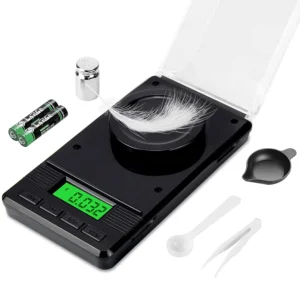Do you know the unit of medicine or vitamin? When it comes to taking medicine or vitamins, it’s important to understand the unit of measurement used to ensure proper dosage and avoid potential harm. In healthcare, there are various units used to measure medication and vitamin dosages. In this article, we’ll explore these units and how to properly interpret them.
What Is The Unit of Medicine?

The unit of medicine can vary depending on what aspect of medicine you are referring to. Here are a few common units in medicine:
1. Dosage Units:
Medications are often prescribed in specific dosage units, such as milligrams (mg), micrograms (mcg), or International Units (IU), depending on the medication and its form.

2. Volume Units:
Liquid medications, like syrups or injections, are measured in volume units like milliliters (mL) or cubic centimeters (cc).

3. Time Units:
When it comes to medication schedules, time units are used, such as hours (h) or days (d), to specify when and how often a medication should be taken.

4. Concentration Units:
Concentration of substances in the body, such as blood glucose levels, may be measured in units like milligrams per deciliter (mg/dL) or millimoles per liter (mmol/L).
5. Diagnostic Units:
Laboratory test results can be expressed in various units, depending on the specific test. For example, blood cell counts might be measured in cells per microliter (cells/μL).
6. Pressure Units:
Blood pressure is typically measured in millimeters of mercury (mmHg).
7. Temperature Units:
Body temperature is measured in degrees Celsius (°C) or Fahrenheit (°F), depending on the region.
8. Dose Units:
Radiation therapy or radiology may use units like gray (Gy) or sievert (Sv) to measure radiation doses.
The choice of unit depends on the context and what is being measured or prescribed in the field of medicine.

Milligrams (mg)
Milligrams are a commonly used unit of measurement for medication and vitamins. One milligram is equal to one-thousandth of a gram. This unit is typically used for drugs that have a low therapeutic index, which means that there is a narrow range between the dose that provides therapeutic benefit and the dose that can cause harm. Common medications that use milligrams as their unit of measurement include pain relievers, antibiotics, and antihistamines.
How Miligram Is Measured?
In practical terms, a milligram can be visualized as a very small amount. For context, a typical aspirin tablet might weigh around 325 milligrams, and a grain of rice weighs roughly 300 milligrams. To measure milligrams accurately, precision instruments like digital scales or calibrated measuring devices are commonly used in various scientific, medical, and pharmaceutical applications. These tools ensure the precise administration of medications, promoting patient safety and the effectiveness of treatments.

Micrograms (mcg)
Micrograms are a smaller unit of measurement than milligrams. One microgram is equal to one-thousandth of a milligram. This unit is typically used for drugs that require very small dosages, such as hormones, vitamins, and certain chemotherapy drugs.
Micrograms (mcg or µg) are a unit of measurement used to quantify very small amounts of mass. One microgram is equal to one millionth of a gram or 0.000001 grams. This incredibly tiny unit is often employed in scientific, medical, and pharmaceutical contexts to measure substances at the microscale level.
Micrograms are particularly important in the field of medicine when dealing with precise dosages of medications, especially in situations where even a milligram (one thousandth of a gram) would be too much. For example, some vitamins, minerals, and active pharmaceutical ingredients are dosed in micrograms.
How Micrograms(mcg) Measured?

To ensure accurate measurements, specialized laboratory equipment such as microgram scales and analytical balances are used. These tools allow healthcare professionals and scientists to work with utmost precision, ensuring the safety and effectiveness of various medical treatments and research endeavors.
CC or Milliliters (mL)
CC or milliliters are units of measurement used for liquid medications. One milliliter is equal to one cubic centimeter. This unit is particularly important for medications that need to be administered precisely, such as insulin or certain antibiotics.
Understanding the correct unit of measurement is essential when taking medication or vitamins. Incorrect dosages can lead to serious side effects or even death. It’s important to follow your healthcare provider’s instructions for dosage and to ask questions if you’re unsure.
Knowing the medicine or vitamin unit called is crucial to properly measuring and administering medication or vitamins. Whether it’s milligrams, micrograms, international units, or milliliters, each unit has its own purpose and importance in healthcare. If you have any questions or concerns about dosage or measurement, don’t hesitate to consult your healthcare provider.
How Mililiters(ML) Is Measured?
milliliters (mL) are a unit of measurement used to quantify volume. One milliliter is equal to one thousandth of a liter, or approximately 0.034 fluid ounces. Milliliters are commonly used in various fields, including medicine, to measure liquid medications, solutions, and other substances.

The milliliter is especially important in healthcare, where precise dosing of medications is crucial. Liquid medications, oral solutions, injections, and intravenous fluids are often measured and administered in milliliters. Medical professionals use calibrated syringes, droppers, and measuring cups to ensure accurate dosages according to patients’ needs. By using milliliters as a standard unit of volume, healthcare providers can maintain consistency and accuracy in drug administration, promoting patient safety and effective treatment.
What Does The IU Stand For?
IU stands for International Unit. It is a unit of measurement used to quantify the biological activity of drugs, vitamins, and hormones. The International Unit is particularly important for vitamins because different forms of the same vitamin may have different potencies. For example, vitamin D can be found in two forms: D2 and D3, and the IU measurement allows for an accurate comparison of the potency of these two forms. The use of International Units helps ensure that patients receive the appropriate dosage of medication or vitamins.
Why Are Vitamins Measured in IU?
Vitamins are measured in International Units (IU) because they are biological substances that may exist in different forms with different potencies. The IU measurement system allows for a standardized way of comparing the biological activity of different forms of the same vitamin.
For example, vitamin D can be found in two forms: D2 and D3. These two forms have different potencies, and measuring them in milligrams (mg) would not accurately reflect their potency. However, measuring them in IU provides a standardized measure of their biological activity, which can help ensure that patients receive the appropriate dosage of the vitamin.
The IU measurement system is also useful because it takes into account the different ways in which vitamins are absorbed and utilized by the body. This means that different forms of the same vitamin can have different potencies depending on how they are processed by the body.
Overall, the use of IU for measuring vitamins allows for a standardized and accurate way of comparing the potency of different forms of the same vitamin and helps ensure that patients receive the appropriate dosage of vitamins for their individual needs.
What Is International Units of Vitamin D?
International Units (IU) is the unit of measurement used for vitamin D. The amount of vitamin D that a person needs can vary depending on age, sex, health status, and other factors. The recommended daily intake of vitamin D varies by country and organization. For example, the United States Institute of Medicine recommends a daily intake of 600-800 IU of vitamin D for most adults, while the Endocrine Society recommends a daily intake of 1,500-2,000 IU for adults who are at risk of vitamin D deficiency.
When purchasing vitamin D supplements, it is important to check the label to determine the amount of vitamin D in International Units. For example, a typical dose of vitamin D3 supplement may range from 400 IU to 5,000 IU per tablet or capsule, depending on the brand and formulation.
It is important to note that taking too much vitamin D can be harmful, so it is important to follow recommended daily intakes and consult with a healthcare provider if you have any concerns about your vitamin D status or supplement use.
What Is IU Unit In Medicine?
In medicine, IU stands for International Unit, which is a standard measurement used to quantify the biological activity of various substances, such as vitamins, enzymes, and hormones. The IU is an internationally accepted unit of measurement that allows healthcare professionals to prescribe and administer medications and supplements accurately, regardless of the country or region they are in.
The use of IU is particularly important when dealing with substances like vitamins and hormones, where the weight alone might not accurately represent their potency or effectiveness. By using IU, healthcare providers can ensure consistent dosing and therapeutic outcomes for patients, regardless of the specific formulation or brand of the medication or supplement being used.
It’s worth noting that the specific definition of an IU can vary depending on the substance being measured. Different substances have different biological activities, so the IU for one substance may not be equivalent to the IU for another. To avoid confusion, regulatory authorities and scientific organizations establish specific guidelines for calculating IU for different substances, ensuring standardized and accurate dosing in medical practice.
Conclusion
the concept of units in medicine, particularly the International Unit (IU), plays a crucial role in ensuring standardized and accurate dosing of medications and supplements. By providing a uniform measurement of biological activity, IU allows healthcare professionals worldwide to prescribe and administer treatments effectively, regardless of the specific formulation or brand. This standardized approach is essential for patient safety, enabling consistent therapeutic outcomes and reducing the risk of dosage errors. The use of units in medicine exemplifies the precision and rigor necessary in the field of healthcare, ultimately contributing to improved patient care and well-being on a global scale.
















